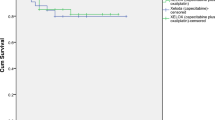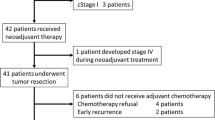Abstract
Purpose:
In patients with locally advanced rectal cancer (LARC), preoperative chemoradiation is known to improve local control, and down-staging of the tumor serves as a surrogate for survival. Intensification of the systemic therapy may lead to higher downstaging rates and, thus, enhance survival. This phase II study investigated the efficacy and safety of preoperative capecitabine and oxaliplatin in combination with radiotherapy.
Patients and Methods:
Patients with LARC of the mid and lower rectum, T3NxM0 staged by MRI received radiotherapy (total dose 45 Gy) in combination with oral capecitabine (825 mg/m2 twice a day on radiotherapy days; weeks 1–4) and oxaliplatin 50 mg/m2 intravenously (days 1, 8, 15, and 22). Efficacy was evaluated as rate of tumor down-categorization at the T level.
Results:
A total of 59 patients were enrolled (19 women, 40 men; median age of 61 years) and all were evaluable for efficacy and toxicity. Down-categorization at the T level was observed in 53% with pathological complete response in 6 patients (10%). Actual total radiotherapy, oxaliplatin and capecitabine doses received were 97%, 90%, and 93% of the protocol-specified preplanned doses, respectively. Grade 3/4 toxicity was observed in 15 patients (25%). The most frequent was diarrhea (12%).
Conclusions:
Preoperative chemoradiation with capecitabine and oxaliplatin is feasible in patients with MRI-proven cT3 LARC. The only clinically relevant toxicity was diarrhea. Overall, efficacy of the multimodality treatment was good, but not markedly exceeding that of 5-FU- or capecitabine-based chemoradiation approaches.
Zusammenfassung
Ziel:
Eine präoperative Radiochemotherapie verbessert bei Patienten mit einem tief sitzenden Rektumkarzinom (LARC) die lokale Tumorkontrolle und ein so genanntes „down-staging“ dient als Überlebenssurrogatparameter. Von einer Dosisintensivierung der systemischen Therapie kann man sich höhere Down-Staging-Raten erwarten und damit das Überleben verbessern. Diese multizentrische Phase-II-Studie soll die Wirksamkeit und Toxizität einer neoadjuvanten durch Capecitabin und Oxaliplatin intensivierten Radiochemotherapie prüfen.
Patienten und Methodik:
Patienten mit einem LARC, das mittels MRI als cT3NxM0 klassifizierten wurde, erhielten eine Radiotherapie (45 Gy in konventioneller Fraktionierung) mit konkomitanter Gabe von Capecitabin (oral 2 x täglich 825 mg an den Bestrahlungstagen, Woche 1–4) und Oxaliplatin intravenös 50mg/m2 (an den Tagen 1, 8, 15 und 22). Die Rate an Tumor-Down- Categorization dient als Parameter der Wirksamkeit.
Ergebnisse:
59 Patienten (davon 68% männlich, mittleres Alter 61 Jahre) wurden in die Studie eingeschlossen. Eine Down- Categorization in der T-Kategorie wurde in 53% der Patienten beobachtet, wobei 6 Patienten (10%) eine komplette pathologische Remission zeigten. Die tatsächlich verabreichte Strahlendosis betrug 97%, die Capecitabindosis 93% und die Oxaliplatindosis 90% der im Protokoll festgelegten Gesamtdosis. Akute Nebenwirkungen CTC-Grad ≥3 (Common Toxicity Criteria) wurden in 15 Patienten (25%) registriert, wobei mit 12% eine Diarrhoe am häufigsten vorkam.
Schlussfolgerung:
Eine präoperative Radiochemotherapie mit Capecitabin und Oxaliplatin ist bei Patienten mit mittels MRI diagnostiziertem cT3 LARC gut durchführbar. Die einzige klinisch relevante Nebenwirkung war eine Diarrhoe. Allerdings übertrifft die Wirksamkeit nicht wesentlich die bisherigen Erkenntnisse von Studien mit kontinuierlicher 5-Fluorouracil- oder alleiniger Capecitabingabe.
Similar content being viewed by others
References
Aschele C, Pinto C, Cordio S, et al. Preoperative fluorouracil (FU)-based chemoradiation with and without weekly oxaliplatin in locally advanced rectal cancer: Pathologic response analysis of the Studio Terapia Adiuvante Retto (STAR)-01 randomized phase III trial. J Clin Oncol 2009;27:18s.abstract CRA4008.
Beets-Tan RGH, Beets GL. Rectal cancer: review with emphasis on MR imaging. Radiology 2004;232:335–46.
Bosset JF, Magnin V, Maingon P, et al. Preoperative radiochemotherapy in rectal cancer: long-term results of a phase II trial. Int J Radiat Oncol Biol Phys 2000;46:323-7.
Bosset JF, Collette L, Calais G, et al. Chemotherapy with preoperative radiotherapy in rectal cancer. N Engl J Med 2006;355:1114–23.
Bouzourene H, Bosman FT, Seelentag W, et al. Importance of tumor regression assessment in predicting the outcome in patients with locally advanced rectal carcinoma who are treated with preoperative radiotherapy. Cancer 2002;94:1121–30.
Dunst J, Reese T, Debus J, et al. Phase-II-study of preoperative chemoradiation with capecitabine in rectal cancer. J Clin Oncol 2004;22:14s.abstract 3559.
Dunst J, Debus J, Rudat V, et al. Neoadjuvant capecitabine combined with standard radiotherapy in patients with locally advanced rectal cancer: mature results of a phase II trial. Strahlenther Onkol 2008;184:450–6.
Francois Y, Nemoz CJ, Baulieux J, et al. Influence of the interval between preoperative radiation therapy and surgery on downstaging and on the rate of sphincter-sparing surgery for rectal cancer: the Lyon R90-01 randomized trial. J Clin Oncol 1999;17:2396.
García-Aguilar J, Hernandez de Anda E, et al. A pathologic complete response to preoperative chemoradiation is associated with lower local recurrence and improved survival in rectal cancer patients treated by mesorectal excision. Dis Colon Rectum 2003;46:298–304.
Gérard JP, Conroy T, Bonnetain F, et al. Preoperative radiotherapy with or without concurrent fluorouracil and leucovorin in T3-4 rectal cancers: results of FFCD 9203. J Clin Oncol 2006;24:4620–5.
Gérard J, Azria D, Gourgou-Bourgade S, et al. Randomized multicenter phase III trial comparing neoadjuvant RT-Capox and RT-Cap in patients (pts) with locally advanced rectal cancer: Preliminary safety results of the ACCORD 12/0405 PRODIGE-2. J Clin Oncol 2008;26:20s.abstract 4089.
Gérard J, Azria D, Gourgou-Bourgade S, et al. Comparison of two neoadjuvant chemoradiotherapy regimens for locally advanced rectal cancer: results of the phase III trial ACCORD 12/0405-Prodige 2. J Clin Oncol 2010;28:1638–44.
Glynne-Jones R, Dunst J, Sebag-Montefiore D. The integration of oral capecitabine into chemoradiation regimens for locally advanced rectal cancer: how successful have we been? Ann Oncol 2006;17:361–71.
Glynne-Jones R, Sebag-Montefiore D, Maughan TS, et al. A phase I dose escalation study of continuous oral capecitabine in combination with oxaliplatin and pelvic radiation (XELOX-RT) in patients with locally advanced rectal cancer. Ann Oncol 2006;17:50–6.
Grann A, Feng C, Wong D, et al. Preoperative combined modality therapy for clinically resectable uT3 rectal adenocarcinoma. Int J Radiat Oncol Biol Phys 2001;49:987–95.
Guillem JG, Díaz-González JA, Minsky BD, et al. cT3N0 rectal cancer: potential overtreatment with preoperative chemoradiotherapy is warranted. J Clin Oncol 2008;26:368–73.
Hartley A, Ho KF, McConkey C, et al. Pathological complete response following pre-operative chemoradiotherapy in rectal cancer: analysis of phase II/ III trials. Br J Radiol 2005;78:934–8.
Heald RJ, Husband EM, Ryall RD. The mesorectum in rectal cancer surgery – the clue to pelvic recurrence? Br J Surg 1982;69:613–6.
Heald RJ, Moran BJ, Ryall RD, et al. Rectal cancer: the Basingstoke experience of total mesorectal excision, 1978-1997. Arch Surg 1998;133: 894–9.
Janjan NA, Abbruzzese J, Pazdur R, et al. Prognostic implications of response to preoperative infusional chemoradiation in locally advanced rectal cancer. Radiother Oncol 1999;51:153–60.
Kapiteijn E, Marijnen CA, Nagtegaal ID, et al. Preoperative radiotherapy combined with total mesorectal excision for resectable rectal cancer. N Engl J Med 2001;345:638–46.
Keilholz L, Mese M, Henneking K, et al. Effect of total mesorectal excision on the outcome of rectal cancer after standardized postoperative radiochemotherapy: do randomized studies translate into clinical routine? Strahlenther Onkol 2009;185:364–70.
Kim JC, Kim TW, Kim JH, et al. Preoperative concurrent radiotherapy with capecitabine before total mesorectal excision in locally advanced rectal cancer. Int J Radiat Oncol Biol Phys 2005;63:346–53.
Kim JS, Kim JS, Cho MJ, et al. Comparison of the efficacy of oral capecitabine versus bolus 5-FU in preoperative radiotherapy of locally advanced rectal cancer. J Korean Med Sci 2006;21:52–7.
Lin EH, Skibber J, Delcos M, et al. A phase II study of capecitabine and concomitant boost radiotherapy (XRT) in patients (pts) with locally advanced rectal cancer (LARC). J Clin Oncol 2005;23:16s.abstract 3593.
Machiels JP, Duck L, Honhon B, et al. Phase II study of preoperative oxaliplatin, capecitabine and external beam radiotherapy in patients with rectal cancer: the RadiOxCape study. Ann Oncol 2005;16:1898–905.
Marquardt F, Rödel F, Capalbo G, et al. Molecular targeted treatment and radiation therapy for rectal cancer. Strahlenther Onkol 2009;185:371–8.
Miwa M, Ura M, Nishida M, et al. Design of a novel oral fluoropyrimidine carbamate, capecitabine, which generates 5-fluorouracil selectively in tumours by enzymes concentrated in human liver and cancer tissue. Eur J Cancer 1998;34:1274–81.
Mohiuddin M, Hayne M, Regine WF, et al. Prognostic significance of postchemoradiation stage following preoperative chemotherapy and radiation for advanced/recurrent rectal cancers. Int J Radiat Oncol Biol Phys 2000;48:1075–80.
De Paoli A, Chiara S, Luppi G, et al. Capecitabine in combination with preoperative radiation therapy in locally advanced, resectable, rectal cancer: a multicentric phase II study. Ann Oncol 2006;17:246–51.
Paskeviciute B, Bölling T, Brinkmann M, et al. Impact of (18)F-FDG-PET/CT on staging and irradiation of patients with locally advanced rectal cancer. Strahlenther Onkol 2009;185:260–5.
Rödel C, Grabenbauer GG, Papadopoulos T, et al. Phase I/II trial of capecitabine, oxaliplatin, and radiation for rectal cancer. J Clin Oncol 2003;21:3098–104.
Rödel C, Martus P, Papadoupolos T, et al. Prognostic significance of tumor regression after preoperative chemoradiotherapy for rectal cancer. J Clin Oncol 2005;23:8688–96.
Rödel C, Liersch T, Hermann RM, et al. Multicenter phase II trial of chemoradiation with oxaliplatin for rectal cancer. J Clin Oncol 2007;25:110–7.
Rödel C, Sauer R, Fietkau R. [The role of magnetic resonance imaging to select patients for preoperative treatment in rectal cancer]. Strahlenther Onkol 2009;185:488–92.
Rutten H, Sebag-Montefiore D, Glynne-Jones R, et al. Capecitabine, oxaliplatin, radiotherapy, and excision (CORE) in patients with MRI-defined locally advanced rectal adenocarcinoma: Results of an international multicenter phase II study. J Clin Oncol 2006;24:Abs 3528.
Sauer R, Becker H, Hohenberger W, et al. Preoperative versus postoperative chemoradiotherapy for rectal cancer. N Engl J Med 2004;351:1731–40.
Sawada N, Ishikawa T, Sekiguchi F, et al. X-ray irradiation induces thymidine phosphorylase and enhances the efficacy of capecitabine (Xeloda) in human cancer xenografts. Clin Cancer Res 1999;5:2948–53.
Sefr R, Kocakowa I, Spelda S. Preoperative radiotherapy and oral capecitabine improve surgical results in patients with locally advanced mid-lower rectal cancer. Eur J Cancer 2005;3:2s.abstract 709.
Stelzmueller I, Zitt M, Aigner F, et al. Postoperative morbidity following chemoradiation for locally advanced low rectal cancer. J Gastrointest Surg 2009;13:657–67.
Theodoropoulos G, Wise WE, Padmanabhan A, et al. T-level downstaging and complete pathologic response after preoperative chemoradiation for advanced rectal cancer result in decreased recurrence and improved disease- free survival. Dis Colon Rectum 2002;45:895–903.
Valentini V, Coco C, Picciocchi A, et al. Does downstaging predict improved outcome after preoperative chemoradiation for extraperitoneal locally advanced rectal cancer? A long-term analysis of 165 patients. Int J Radiat Oncol Biol Phys 2002;53:664–74.
Author information
Authors and Affiliations
Consortia
Corresponding author
Additional information
*ClinicalTrials.gov number, NCT00297141; Parts of this manuscript were previous published as an abstract at ASCO 2007 (Vol 25, No 18S, 2007: 14527).
**The Investigators participating in the Tyrolean Oncology Working Group trial 05 (TAKO 05) and Austrian Breast and Colorectal Cancer Study Group trial R-02 (ABCSG R-02) are listed in the Appendix.
Rights and permissions
About this article
Cite this article
Öfner, D., DeVries, A.F., Schaberl-Moser, R. et al. Preoperative Oxaliplatin, Capecitabine, and External Beam Radiotherapy in Patients with Newly Diagnosed, Primary Operable, cT3NxM0, Low Rectal Cancer. Strahlenther Onkol 187, 100–107 (2011). https://doi.org/10.1007/s00066-010-2182-6
Received:
Accepted:
Published:
Issue Date:
DOI: https://doi.org/10.1007/s00066-010-2182-6




